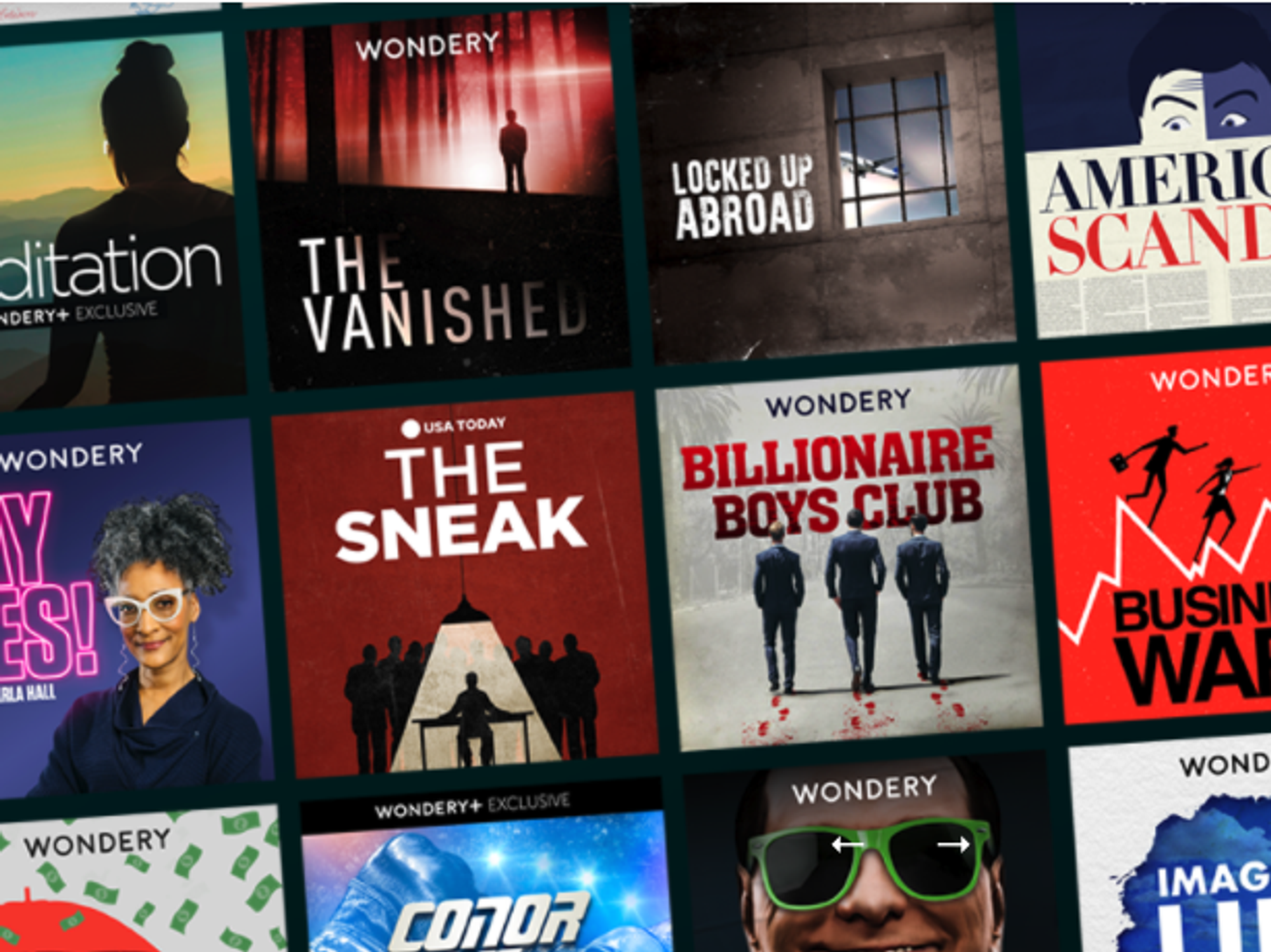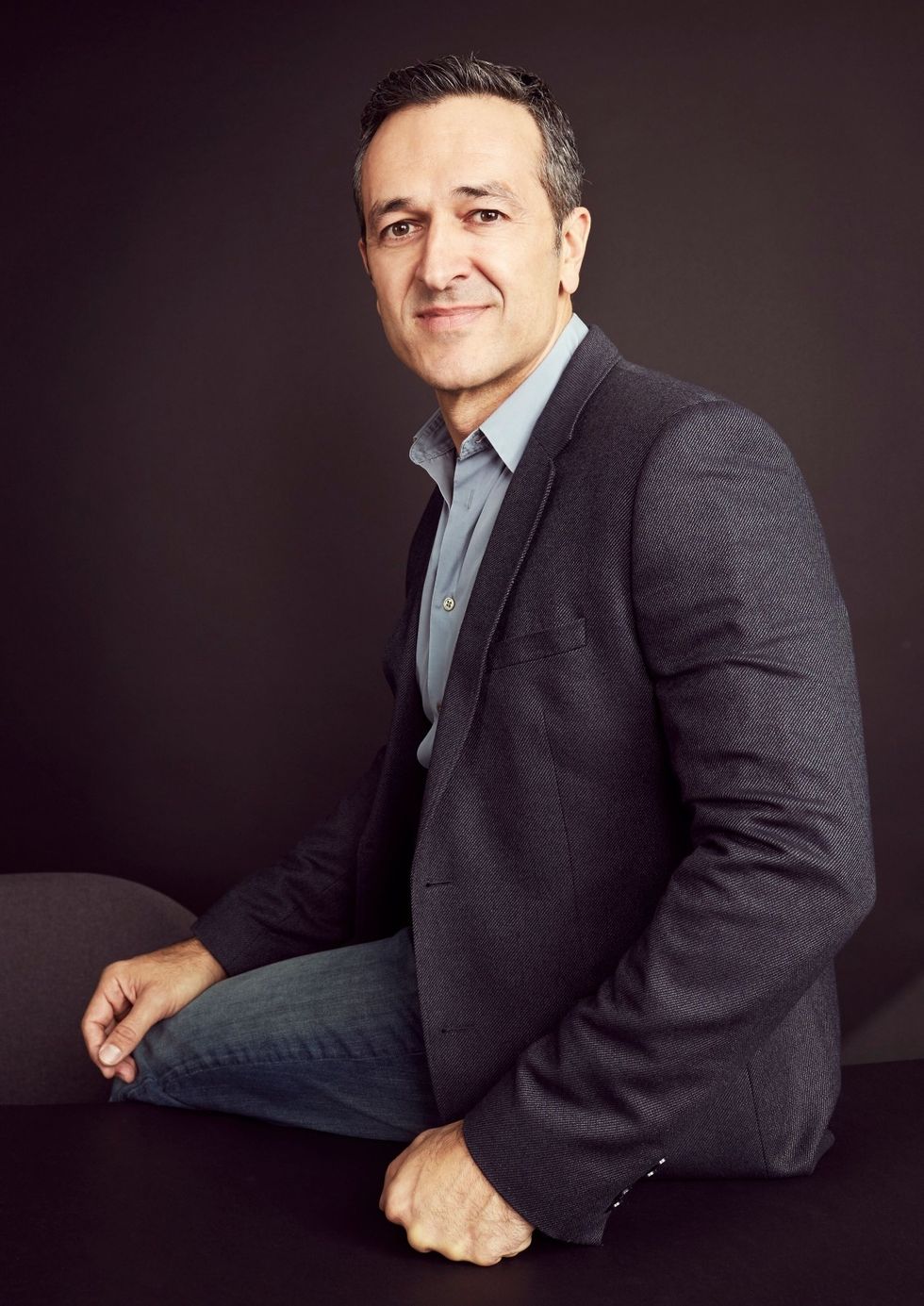Fighting Bribery Charges, Lopez Says it's 'Not Surprising' Companies Want to Buy Wondery
Sam primarily covers entertainment and media for dot.LA. Previously he was Marjorie Deane Fellow at The Economist, where he wrote for the business and finance sections of the print edition. He has also worked at the XPRIZE Foundation, U.S. Government Accountability Office, KCRW, and MLB Advanced Media (now Disney Streaming Services). He holds an MBA from UCLA Anderson, an MPP from UCLA Luskin and a BA in History from University of Michigan. Email him at samblake@dot.LA and find him on Twitter @hisamblake

Over the past five years, West Hollywood-based Wondery transformed from Hernan Lopez's hunch about the future of audio to the sixth largest podcast publisher in the U.S., boasting over 8 million monthly listeners and 30 hit shows.
A former 21st Century Fox executive, Lopez started the podcast studio with the belief that in-depth, narrative audio stories were poised to bloom much like serialized television dramas had when he was in TV; he wanted to make "Breaking Bad" and "Mad Men" versions of podcasts.
Wondery has produced dozens of original series including "Dr. Death" and "Business Wars," and has 19 shows currently in development to become television series. Sony and Apple are reportedly interested in snapping up the producer as the media behemoths try to ramp up their presence in the growing podcast market.

Hernan Lopez started Wondery with the belief that in-depth, narrative audio stories were poised to bloom.
Wondery does not publicly disclosed its financials, but Lopez has previously said the company is profitable. Some analysts reportedly peg its worth between $300 and $400 million. About three-quarters of Wondery's revenue comes from advertising, but Lopez said its revenue share from content licensing is growing (Wondery owns the intellectual property for all of its originals). It also launched a subscription service, Wondery Plus, in June.
While the company is enjoying its moment, Lopez is personally under fire. He's facing allegations for wire fraud and bribery stemming from his time at Fox, in relation to broadcasting rights for international soccer tournaments. He has denied any wrongdoing but the situation has cast a cloud over the company.
dot.LA spoke with the Wondery chief about the allegations, why he thinks the podcast industry needs to diversify its revenue streams, and how memories of the early days of Netflix are driving the surge of podcasting M&A.
Regarding the allegations against you of bribery and wire fraud – around which you've said you maintain your innocence and believe you will be exonerated by a jury – what's your understanding of how the prosecutors even came to the impression that these allegations occurred and that you were involved?
All I'll tell you is that they got it wrong. I know that they got it wrong and my lawyers know that they got it wrong. And, I'm very confident that when the facts come out they will see that they got it wrong, but I don't really want to comment beyond that.
How is this episode affecting the company and you personally?
As you would expect, it's something that you feel is unfair, because being unfairly accused of something, wrongly accused of something, it's just...not great. What can I say? But I just keep my chin up, and I'm going to work every day knowing, in my heart, that people that know my character and know me – that if you ask anybody they will tell you, anybody who knows me, knows that there's no way that that will be true. And it's not affecting the company.
What can you tell me about the swirling talks that Wondery might soon be acquired?
The only thing that we're saying publicly is that it shouldn't be surprising that companies are approaching us.
Hypothetically speaking, then, if you were further to explore being acquired, what kind of arrangement would be attractive to you?
All I can say is that we love being independent. I've had a lot of fun and I'm still having a lot of fun running this company and building it from the ground up. So for us, that independent spirit means a lot. Driving value and continuing to make the shows that our listeners care about is of utmost importance. And making sure that our employees are thriving and happy is hugely important; every single one of our employees has an option or is a stockholder and I just want to make sure that whatever we end up doing, it's the right outcome for them.
What's your vision on how you see the podcasting industry growing and improving its monetization?
The more diversified your revenue streams, and the more recurring, the better for the health of a business. So I think we're going to see more people realizing that revenue streams beyond advertising don't detract from advertising revenue because not only can you have multiple revenue streams, but they sometimes can even help your advertising business. Every time there's a television show on air about one of our podcasts, our listening goes up, and that in turn helps our advertising business and also helps our subscription business, because it's just more awareness of the story and more awareness of the Wondery brand.
How has the pandemic affected Wondery in terms of audience size and revenue?
We were hit in the second quarter on advertising revenue but that's way more than reversed now. On audience size, we're now higher than we were before the pandemic. I think that's true industry-wide, because what's happened is that a lot of people discovered how they could listen to podcasts at home, in moments of the day that they weren't previously listening.
Q3 was through-the-roof strong. For us, it was essentially double year- on- year. And Q4 is very strong as well. Our non-advertising revenue was significantly up versus last year in the second quarter and throughout this year; we finalized a number of licensing deals in the second quarter and that laid the foundation for recurring revenue over the following months.
What are your plans for Wondery's further growth?
The primary driver is continued audience growth, and better monetization from multiple revenue streams and Wondery Plus; a subscription business is a very strategically important part of our business because it not only brings revenue, but it also allows us to connect directly with our superfans.
We also want our share of international revenue to keep increasing over time. We've been doing limited local language translation, partially because the marketplaces outside of the U.S. are younger than the U.S. is, and we have wanted to concentrate first on monetizing our English-language audience, which is significant in Canada, Australia, and the U.K. But now we're ready to accelerate our local language strategy, starting next year, and even produce fully local stories in some places.
How does being headquartered in Los Angeles help Wondery?
Los Angeles is the capital of the entertainment world, especially when it comes to television, and a lot of what we do is borrowed from the television and film industries, both on the creative and editorial side as well as the marketing toolkit. So it's easier here to talk to somebody who knows what characters and stakes are, because everybody in Hollywood talks about characters and stakes.
What do you see as the driver behind the recent consolidation in podcasting, and to what extent do you think it will continue, whether Wondery's involved or not?
I'll give you an analogy. In 2010, when I was at Fox – and you could've said the same thing at Disney or Viacom or Comcast – we were all looking at Netflix and thinking, 'That's a cute little company.' It was worth $3 billion and I can guarantee you, all of us, at the time, thought it was hugely overvalued – that one day people are going to realize how silly they were that they were valuing Netflix at $3 billion.
In 2010, they were two years into streaming, broadband connections weren't as good and streaming libraries were not great and people barely had started using the iPad, so Netflix was still better known for the DVD business than it was known for the streaming business. $3 billion. Only 10 years later, how much is Netflix worth today? More than all of the other media companies. So, I think what's happened is that a lot of the companies that missed out on the potential to buy Netflix, and a lot of companies who are parallel, are looking at that and saying, 'Look, are we going to miss out on a massive consumer trend?' It's undeniable that there's an increase in consumption of audio in general, and in particular of podcasts, so companies want to be part of that consumer trend.
Do you see that affecting Wondery's competitiveness?
I don't, because there's something really powerful about being a neutral and independent platform with the ability to launch 30 number one hits, which is when creators want to make their show, they typically care about three things: a) how they're treated creatively; b) how many listeners are their shows going to be in front of; and c) the economics. It's hard to find the ideal combination of all three for any creator and Wondery's an ideal home for all three. There aren't many other companies that have taken a complex story idea to an end product as repeatedly as we have.
Editor's note: This interview has been edited for brevity and clarity.
Sam primarily covers entertainment and media for dot.LA. Previously he was Marjorie Deane Fellow at The Economist, where he wrote for the business and finance sections of the print edition. He has also worked at the XPRIZE Foundation, U.S. Government Accountability Office, KCRW, and MLB Advanced Media (now Disney Streaming Services). He holds an MBA from UCLA Anderson, an MPP from UCLA Luskin and a BA in History from University of Michigan. Email him at samblake@dot.LA and find him on Twitter @hisamblake




 Image Source: Skyryse
Image Source: Skyryse
 Image Source: Northwood Space
Image Source: Northwood Space